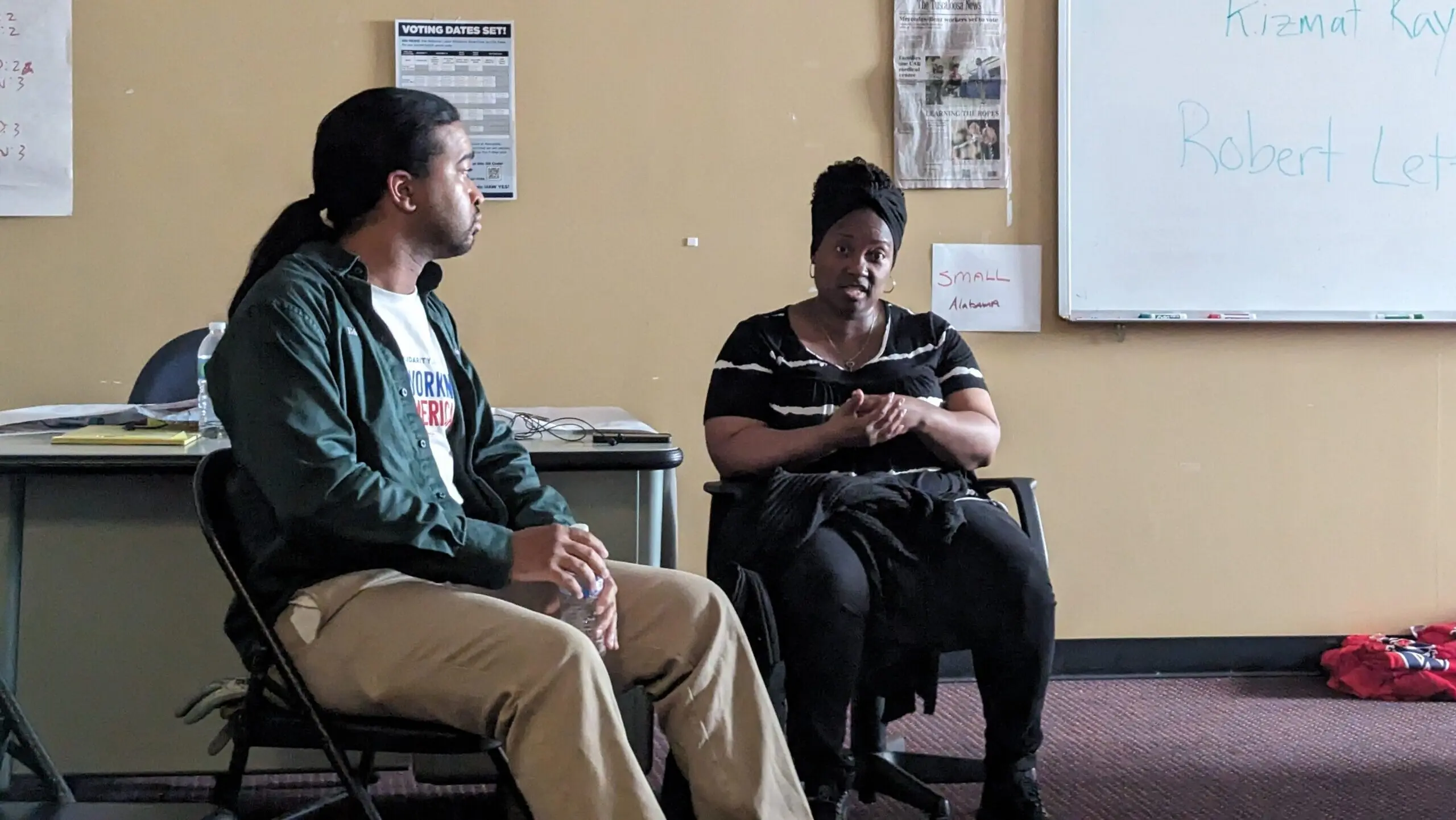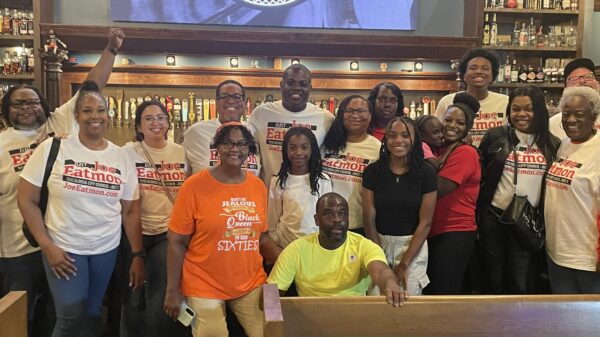|
Getting your Trinity Audio player ready...
|
Both turnout and enthusiasm in the union election at the Mercedes plant in Vance have reportedly been high, which the UAW is viewing as a positive sign. Workers have been casting ballots since Monday and the election will close at 9:45am on Friday.
The election is being supervised by agents from the National Labor Relations Board, with observers from both Mercedes and the United Auto Workers present as well.
Rick Webster, who works at Mercedes’ Plant 2 doing final fit and finish, said that “how the National Labor Relations Board has been handling [the election] has been fantastic. They have kept everything above board.”
On Wednesday night, two Mercedes employees, Robert Lett and Kizmat “Kay” Finklea, sat down with reporters at the UAW Local 112 headquarters in Coaling to share their experiences as Mercedes workers and their experiences this week as part of the unionization campaign.
Experiences at the Mercedes plant
Both long-time Mercedes employees, Finklea and Lett complained that management at the Mercedes plant has gotten markedly worse over the past few years. They mentioned inadequate training for new employees, an unresponsive and unhelpful human resources department, and a general lack of respect for employees, all contributing to a generally negative workplace culture and a reportedly high turnover rate.
While new employees at Mercedes are supposed to have designated trainers, Lett said that now “they’ll just get thrown with some random person. That person is watching them for maybe two or three cars and then they’re walking away.”
Left overwhelmed and told not to pull the cords used to request team leaders’ help, many new hires quit soon after starting. Lett and Finklea said they have both personally witnessed new employees say they’re going to the restroom, never to return.
Working at Mercedes is “not a career job anymore,” Finklea said. And she says that the jobs are especially rough on parents who have to take care of children.
In one striking anecdote, Lett talked about a Mercedes employee whose child got sick at school while he was working and no one else was able to pick the kid up from school. “So, obviously, being a parent, he went and got them himself and [Mercedes] fired him because they said that he left,” Lett recounted.
Another major sticking point is a recent change in the schedules that Mercedes employees work that was instituted over Mercedes workers’ complaints, according to Finklea.
Finklea stated: “Two years ago we started this schedule and they asked, did an inquiry, and we said ‘No, we didn’t want to go to this schedule because we did not feel like it would be a good home life balance.’”
Under the new schedule, workers are supposed to work ten hours a day for six days in a row, then have a two day break, work ten hours a day for six more days, and then have a five day break. In reality, Finklea says, shifts are almost always twelve hours and workers only receive time-and-a-half pay for the two additional hours a day.
“We went from having two weekends off a month to one,” she said. “How is that better for me and my family?” Finklea also complained that due to how the new schedules affect overtime, workers are working more hours for less pay.
When employees have problems with management, they then have to rely on what Lett and Finklea characterized as a quickly deteriorating HR department. “HR takes care of Mercedes. No one takes care of us,” Finklea said.
“This isn’t a mom and pop organization I’ve been working for,” Lett griped. “They didn’t just start this in somebody’s basement a few weeks ago. Like this is a multi-billion dollar corporation that’s been around more than 100 years. You know, they’ll be okay giving us a little bit of a raise.”
Organizing a union in the South
Lett and Finklea credited fellow Mercedes employee Jeremy Kimbrell with getting the campaign off the ground. They also both said the success of the UAW’s Stand Up Strike really inspired workers at the plant to take the campaign seriously and to get involved.
The Stand Up Strike was a months-long strike by UAW members employed by the so-called Big Three automakers: General Motors, Ford, and Stellantis. Thanks to UAW President Shawn Fain’s innovative “Stand Up” strike tactics, where the union announced which plants would begin striking every week instead of having every plant go on strike simultaneously and quickly draining the strike fund, Big Three auto workers won raises between 25 and 160 percent.
Lett explained that trying to unionize before the Stand Up Strike was like trying to sell a dream, but it became far easier to explain the potential benefits of unionizing to workers on the fence after the UAW got the Big Three to agree to major raises. “We actually had something we could point to and say they got X, they got Y, they got Z, we can do the same thing,” Lett said.
Even before the campaign really got underway, workers who had watched the Stand Up Strike play out were already interested in organizing with the UAW.
Finklea said that at first they “just started sending emails out to people, trying to see who was interested and felt the same way. And people were, because they were walking around the shop saying stuff like ‘Where are they?’; ‘Where’s the union?’; ‘What you guys gonna do for us or whatever?’”
Mercedes and other anti-union voices have repeatedly tried to paint the UAW as an outside interloper, but the UAW just gave Mercedes workers interested in unionizing “the support we needed,” Finklea explained. “They were there to give us that and pretty much let us do everything.”
Despite the visible example of the Stand Up Strike, many Mercedes employees are still incredibly skittish about joining the UAW. After all, while Alabama is one of the most unionized states in the South, its 8.6 percent unionization rate is still below the 11.2 percent national average. Lett and Finklea say that most Mercedes workers, including themselves, have never personally experienced being a member of a labor union.
“When we first started the campaign, it was trying to explain to people that it wouldn’t be some outside entity coming in and taking over the company, that it would just be us going into meetings and going into different decision making situations,” Lett stated.
Mercedes requires employees to wear specific Mercedes shirts while working but many pro-union workers have been wearing union shirts underneath their button-ups to show their co-workers that they support the campaign. Some also wear UAW hats, bracelets, and buttons.
“Most people have never worked in the union environment before but you’re trying to get them to understand that for the most part the job is still going to be the same,” Lett said. The union organizers, he says, have been trying to explain that most of what will change will be the creation of more accountability and a more responsive power structure.
Allegations of Mercedes union busting
Since the campaign began in January, the United Auto Workers and individual pro-union Mercedes employees have repeatedly complained about how Mercedes has responded to the unionization campaign. So far, the UAW has filed six unfair labor practice charges against Mercedes, accusing the company of several practices that are illegal under the National Labor Relations Act.
In response to the UAW’s charges, a Mercedes spokesman stated that the company “has not interfered with or retaliated against any Team Member in their right to pursue union representation.”
“This has probably been the most strategic and organized union busting campaign in decades,” Webster said. “But it’s not going to work.”
“We’re having to watch videos every day,” Lett complained. “They’re texting our phones three times a day. They’re mailing us stuff.”
In addition to the constant text messages, Lett and Finklea specifically pointed to the sheer amount of anti-union literature that they see posted around the plants.
It’s farcical to pretend Mercedes is neutral, Lett says, when many of the posted flyers say “if you don’t want a union, vote no” at the bottom. He claimed that as the election drew closer, the flyers being posted stopped saying “if you don’t want a union, vote no” and started just saying “vote no.”
In the weeks leading up to the election, Mercedes also replaced former plant CEO Michael Göbel with Federico Kochlowski, the plant’s vice president of operations. Kochlowski has attempted to present a more friendly face to Mercedes employees, promising improvements to company policy and culture.
“I find it funny that he’s pretending like he just got off the plane,” Lett shared. “He’s been here for a year now as a VP.” Lett elaborated further by pointing out that as vice president of operations, Kochlowski likely approved many of Göbel’s decisions.
The mandatory meetings that workers are forced to sit through at the start of every shift were also a target of significant ire.
These daily captive audience meetings used to be when workers “would be going over, say, quality issues or safety from the day before,” Lett explained. “That does get addressed briefly, but not as in depth as before. Because now the majority of time is devoted to showing you an anti-union video.”
On April 7, 2022, NLRB General Counsel Jennifer Abruzzo announced that she believes that captive audience meetings “inherently involve an unlawful threat that employees will be disciplined” and urged the Board to “find mandatory meetings of this sort unlawful.” However, Abruzzo’s interpretation is not yet a binding NLRB precedent.
Finklea says that throughout the campaign one of Mercedes’ key tactics has been trying to scare workers by telling them that the union will go on strike, which many employees are currently hesitant to do.
Lett also stated that he believes Mercedes’ tactics are keeping workers unnecessarily scared of the union. “When the company is putting union busting stuff up every day, cramming it down their throats, it’s just emphasizing that fear even more,” he said.
Politics and unions, oil and water
Many Alabama politicians have chosen to make their view on the ongoing election exceedingly clear. Gov. Ivey, Secretary of Commerce Ellen McNair, Speaker of the House Nathaniel Ledbetter, and House Majority Leader Scott Stadthagen, to name just a few, have all released anti-union op-eds in various outlets.
The Alabama Democratic Party released a statement saying that the party “stands with the United Auto Workers” on X, formerly Twitter, and former Alabama Sen. Doug Jones attended a pro-UAW rally in Birmingham on May 5.
Webster, Lett, and Finklea all criticized these decisions to politicize the union drive, saying that the campaign is really just about Mercedes workers’ economic and safety concerns.
“I think that the politicians should honestly just stay out of it,” Webster explained. “This is about me and my fellow workers at Mercedes, and us having a voice and being able to negotiate fairly with the company.”
Lett said that even people who were personally anti-union have been “taken aback” by the frequency of Gov. Ivey’s anti-union missives and statements.
“She was just throwing out all these different things to try to badmouth the union but she wasn’t even addressing the issues that people that were anti [union] wanted addressed,” Lett explained.
Lett and Finklea also questioned whether Gov. Ivey was knowledgeable enough to talk about how workers at the Mercedes plant should vote. Finklea quipped that “[Gov. Ivey has] never put a part on the car so she really can’t talk about it.”
Anti-union politicians’ statements have reportedly changed some workers’ minds, or at least made them more secure in their position. “But what we try to do with that is let them know this is not about politics, this is strictly about us and making things better for us, so we’ll have a good work environment,” Finklea said.
Despite anti-union messaging primarily coming from Republican politicians, Lett says that UAW supporters are still “from pretty much every aspect of the political spectrum you can think of.”
“People who might not hang out with each other on the weekend are seeing eye to eye,” he continued.
Local politicians in the Tuscaloosa area have also gotten involved in the union drive. As APR reported on previously, Tuscaloosa city councilor and reverend Matthew Wilson starred in an anti-union video Mercedes sent to employees on Monday. According to Finklea, he spoke directly to Mercedes workers at the plant as well.
“I think he did convince some people,” Finklea said. “I don’t know why, but yes, I think he did.”
Finklea was personally put off by how Wilson used his faith and his race to argue that Mercedes workers should vote against unionizing.
“His message was more along the lines of ‘this job has been great for people like me and people who look like me.’ So that, to me, was racist,” Finklea stated.
Looking forward to the results and after the election
Kayla Blado, the NLRB press secretary, said on May 10 that results will be released “probably between 1-3pm ET” on Friday.
Webster is confident that the NLRB will announce a UAW victory on Friday, but he remains concerned that Mercedes may “try to delay it long enough to get the election decertified.”
Lett and Finklea said that conversations with their fellow employees have only reinforced their personal beliefs that the UAW will win this election.
“Like everyone that I’ve talked to has positive things to say,” Lett said. “Even the people who they know that voted no, there weren’t any shocks. It’s essentially all been what we were expecting so far. So we’re very optimistic right now.”
“We’ve had a few people who’ve kind of changed their minds and I was hoping for a bigger win, but I’ll take a close win,” Finklea said.
If the UAW wins the election, it will be the second major win for the union in the historically anti-union South, after a win in May at a Volkswagen plant in Chattanooga, Tennessee. Pro-union Mercedes employees reported feeling encouraged by the UAW victory in Chattanooga, and they’re now incredibly aware of what another victory on Friday might mean to workers across the country.
“Honda, Toyota, and Hyundai, they’re all looking to us to see how this goes. We’re gonna pass it and we’re going to make history doing it,” Webster said.
An acquaintance of Lett’s told him that at the BMW plant in Spartanburg, South Carolina, “they’re essentially on pins and needles waiting to see what results are going to be because they’re hoping to get a campaign off the ground.”
If the UAW wins the election, Finklea believes Mercedes workers should do everything in their power to help other Southern auto workers unionize. “I said we just go around and help them or help them to get where we are, try to offer, support whatever they need,” she explained.
Even if the UAW loses the election, Lett says he is still optimistic for the UAW’s future in Tuscaloosa: “Mercedes is going to be unionized, it doesn’t matter if it’s Friday or in the future. There’s too much frustration there for us to not eventually unionize.”
“This is a post-COVID world,” Lett said. “Corporations have to understand that they can’t treat people in any haphazard way and think that they’ll just hold their heads down and say, ‘no, I can’t do any better.’ People understand now that life’s too short.”
And if the NLRB does announce that the UAW will be representing Mercedes workers, Finklea, Lett, and Webster are all more than ready to move onto negotiating a new contract.
“I hope and pray that [new CEO Federico Kochlowski] does exactly what he said. He wants to be there for us. He wants to work with us. Isn’t that what he says in the letter?” Finklea asked. “So if that’s the case, then [contract negotiations will] be the opportunity to do it.”














































